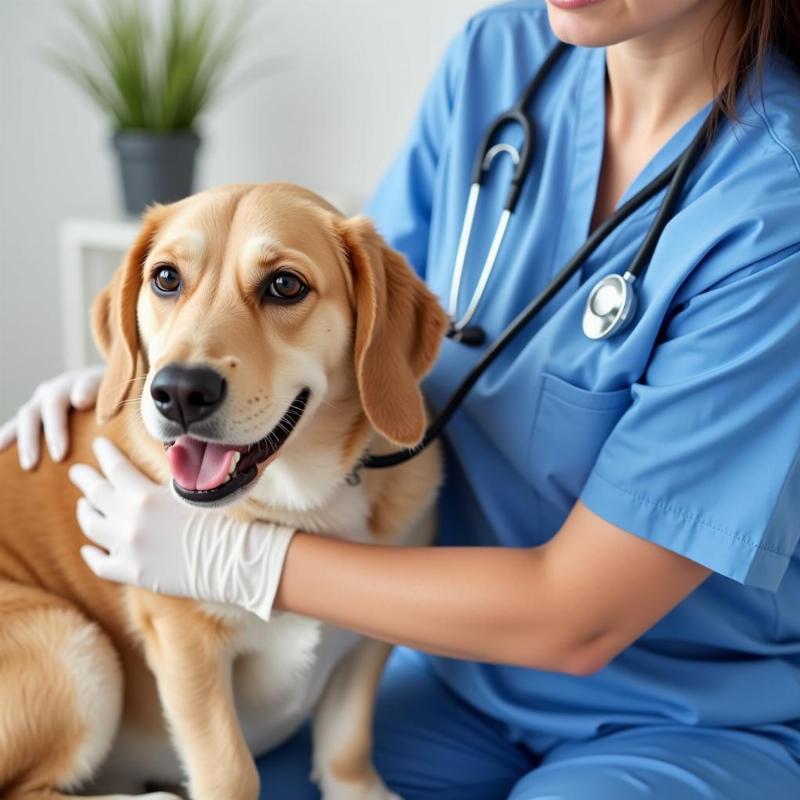Facing the possibility of losing a beloved dog to stomach cancer is a heartbreaking experience. This comprehensive guide aims to provide pet owners in the US with information and resources to navigate this difficult time. We’ll discuss symptoms, diagnosis, treatment options, and ways to provide comfort and care during your dog’s final stages of life.
Recognizing the Signs: Is it Stomach Cancer in Dogs?
Stomach cancer in dogs, while relatively rare, can be challenging to diagnose early. Symptoms can often mimic other digestive issues, making it crucial to consult with a veterinarian at the first sign of anything unusual. Common indicators may include vomiting, loss of appetite, weight loss, abdominal pain, lethargy, and changes in bowel movements. It’s important to remember that these symptoms don’t definitively point to stomach cancer, but warrant a veterinary examination.
Diagnosing Canine Stomach Cancer: What to Expect at the Vet
If your veterinarian suspects stomach cancer, they will likely recommend a series of diagnostic tests. These may include blood work, urinalysis, fecal exams, abdominal X-rays, ultrasounds, and possibly a biopsy. A biopsy, which involves taking a small tissue sample for examination, is often the definitive way to confirm a diagnosis of stomach cancer. The specific diagnostic approach will depend on your dog’s individual circumstances and the veterinarian’s assessment.
Treatment Options and Palliative Care
Treatment options for canine stomach cancer vary depending on the type and stage of the cancer. Surgery may be an option to remove the tumor if it’s localized. Chemotherapy and radiation therapy may also be considered to slow the progression of the disease. Unfortunately, stomach cancer in dogs often carries a poor prognosis. Therefore, palliative care, focused on managing pain and improving quality of life, is often a significant aspect of the treatment plan.
 Veterinarian Examining a Dog for Stomach Cancer
Veterinarian Examining a Dog for Stomach Cancer
Providing Comfort and Support During End-of-Life Care
Caring for a dog with stomach cancer involves providing a comfortable and supportive environment. This includes ensuring they have a soft, comfortable place to rest, offering easily digestible food, and administering pain medication as prescribed by the veterinarian. Maintaining a regular routine and providing plenty of love and attention can also help improve your dog’s quality of life during this challenging time. Remember to consult with your veterinarian about specific dietary recommendations and pain management strategies.
Navigating Grief and Loss: Resources for Pet Owners
Saying goodbye to a cherished pet is one of the most difficult experiences a pet owner can face. There are resources available to help you navigate the grief and loss associated with losing your dog to stomach cancer. Pet loss support groups, online forums, and grief counselors specializing in pet loss can provide comfort and guidance during this difficult time. Don’t hesitate to seek out these resources if you need support.
Conclusion
Coping with a dog diagnosed with stomach cancer requires strength, compassion, and information. By understanding the signs, diagnosis, treatment options, and end-of-life care, you can provide your beloved companion with the best possible support during this challenging time. Remember, seeking professional veterinary advice is crucial throughout this process.
FAQ
- What are the early signs of stomach cancer in dogs? Early signs can be vague and include vomiting, loss of appetite, weight loss, and lethargy.
- How is stomach cancer in dogs diagnosed? Diagnosis usually involves blood tests, imaging (X-rays, ultrasound), and biopsy.
- Is there a cure for stomach cancer in dogs? Unfortunately, stomach cancer in dogs often has a poor prognosis. Treatment focuses on slowing progression and palliative care.
- How can I make my dog comfortable during end-of-life care? Provide a comfortable resting place, offer easily digestible food, manage pain with veterinarian-prescribed medication, and offer lots of love and attention.
- What resources are available for pet owners grieving the loss of a dog? Pet loss support groups, online forums, and grief counselors specializing in pet loss can provide valuable support.
- What should I feed my dog with stomach cancer? Consult your veterinarian for specific dietary recommendations, as they may suggest easily digestible foods.
- How can I manage my dog’s pain from stomach cancer? Your veterinarian can prescribe pain medication to help manage your dog’s discomfort.
Beautdogs.us is a leading dog lifestyle website in the US, providing expert advice on dog breeds, care, and products. We offer authoritative yet accessible content for both new and experienced dog owners. For expert guidance on all aspects of dog ownership, visit Beautdogs.us or contact us at [email protected] or +1 501-555-7529.